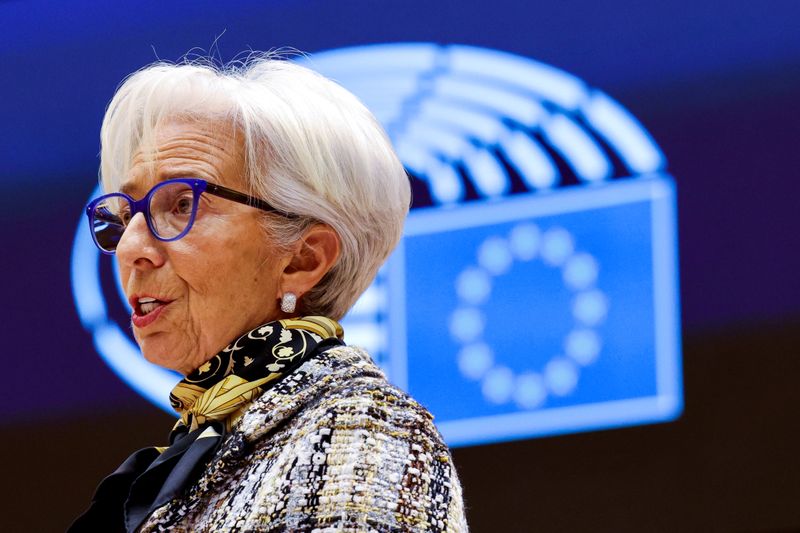TSX gains after CPI shows US inflation rose 3%
(Bloomberg) -- European Central Bank policy makers have all the evidence they need to keep in place their ultra-loose monetary stimulus when they meet on Thursday, thanks in part to their opposite numbers at the Federal Reserve.
Despite a faster U.S. economic rebound from the pandemic and far higher inflation than in the euro zone, Fed officials have signaled they won’t slow bond buying at their own decision a week later. Their reasoning? They still can’t be sure that the recovery is entrenched enough to be self-sustaining.
That’s a useful guide for the ECB, whose economy is further behind, and could do without the turbulence of global policy shifts. The euro zone started vaccinations later, and is only just emerging from a double-dip recession. Inoculation goals are months away from being hit, and new virus variants threaten to restrict travel.
“Recent signals from the Fed probably help the ECB,” said Gilles Moec, chief economist at AXA Investment Managers. “I don’t expect fireworks on Thursday, I don’t think they want to rock the boat.”
ECB officials indeed seem unlikely to spring surprises over stimulus. Dovish policy makers such as Executive Board member Fabio Panetta claim there’s no reason to slow the pandemic bond-buying pace of around 20 billion euros ($24 billion) a week.
More-hawkish colleagues such as Bundesbank President Jens Weidmann have stayed mostly quiet on the topic, while President Christine Lagarde insists the ECB will maintain favorable financing conditions well into the economic recovery.
What Bloomberg Economics Says...
“This seems to be no time for the hawks to bicker about more bond buying. Bloomberg Economics expects policy makers to opt for another three months of “significantly higher” purchases through the Pandemic Emergency Purchase Programme.”
-David Powell. For the full report, click here
The last Fed official to speak before a pre-meeting quiet period was Loretta Mester on Friday, who said “we want to be very deliberately patient here because, you know, this was a huge, huge shock to the economy.” New York Fed President John Williams (NYSE:WMB) said he’d go no further than “talking about talking about” where the economy is headed.
The differences with the euro zone are striking. U.S. inflation might climb to 4.7% when May’s data are published on Thursday -- coincidentally just as Lagarde starts her press conference. The OECD says the economy will grow 6.9% this year, surpassing its pre-pandemic size.
Euro-area inflation is running at 2%, marginally above the ECB’s goal, and gross domestic product is seen growing 4.3%, only reaching its pre-crisis level next year.
Uncertainty over the outlook intensified on Friday after weaker-than-expected U.S. payrolls numbers. Both central banks say soaring inflation will subside when energy prices stabilize, and the shortages that have plagued companies ease.
“I don’t believe that inflation and wage pressures will substantially increase,” said Holger Schmieding, chief economist at Berenberg. “In the U.S., the risk is greater, but even there I don’t see wage inflation taking on a life of its own.”
Investors don’t predict either central bank will taper bond-buying until September at the earliest, and won’t raise interest rates until at least 2023.
Echoes of that dovishness can also be seen at the Bank of Japan and the Reserve Bank of India, while the People’s Bank of China says it won’t make abrupt policy changes.
Some smaller economies are acting against inflation however. Officials in New Zealand and South Korea have signaled potential interest-rate increases and Canada flagged a reduction in debt purchases. Norway may hike rates within months, Iceland has already done so, and emerging economies Russia and Brazil have also started tightening.
Global Divergence
“There’s a clear divergence opening up,” said Mansoor Mohi-uddin, chief economist at the Bank of Singapore Ltd. “The Fed will only be slow to taper its asset purchases while the ECB and the BOJ also are keen to keep monetary conditions loose during the pandemic.”
Fiscal stimulus may help determine any turning point. U.S. President Joe Biden’s blockbuster $1.9 trillion package this year delivered a massive fillip by sending checks to households, but that sugar rush may already be fading. A follow-up package for infrastructure is bogged down in Congressional talks.
Treasury Secretary Janet Yellen wants Biden to press on, and told Bloomberg News on Sunday that somewhat higher inflation would be welcome because it would allow interest rates to rise.
Read more: Yellen Says Higher Interest Rates Would Be ‘Plus’ for U.S., Fed
The European Union has relied on national support such as loan guarantees and furloughs that have kept companies afloat and workers in their jobs. It’s also betting on an 800 billion-euro recovery fund to strengthen the economy’s longer-term resilience.
But for the ECB, it’s still unclear how many companies will fail and how many jobs will be lost when current support programs end, and divestments under the recovery fund haven’t even started. Meanwhile avoiding a wind down in stimulus on either side of the Atlantic averts the prospect of economic disruption.
“The risk of unsettling the market will be lower, with lower contagion effects for the euro,” said Axa’s Moec. “It puts the ECB in a safer environment.”
©2021 Bloomberg L.P.
